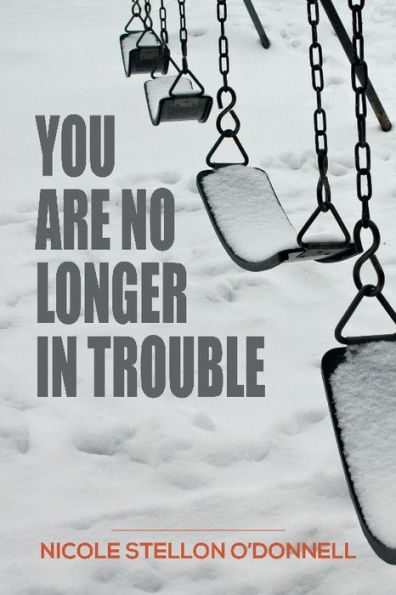Nicole Stellon O’Donnell’s second book of poems draws deeply from her life in public schools — as a student, principal’s daughter, teacher, and mother of schoolchildren. These are prose poems and flash fiction, forms with a colloquial bent appropriate for celebrating and lamenting the five-day school week that defines most American childhoods. In language that moves easily between voices — from second-grader to teenaged rebel to adult authority figure — O’Donnell captures the sound and feel of life in a public school:
Marriage
The rash of weddings at recess continued until Mrs. Provencher had to give a talk. You are third graders. You cannot be married. Parents had called to express their concerns. The margarine tubs full of violets in your desk were bouquets and the flower girls had carried them, stems pressed into foil pilfered from the kitchen drawer. She can say what she wants, but you were married to Doug M. all those years ago, bound by asphalt promises over the screech of the swings’ metal chains.
 The persona here shifts easily from the exasperated teacher to the voice of the defiantly married third-grade girl. At the end, the poem zooms out, fixing those long-ago children in their “asphalt promises” and in the mind of the adult who writes and remembers. O’Donnell catches the solemn innocence of third-grade sexuality in an era when families saved foil and margarine tubs.
The persona here shifts easily from the exasperated teacher to the voice of the defiantly married third-grade girl. At the end, the poem zooms out, fixing those long-ago children in their “asphalt promises” and in the mind of the adult who writes and remembers. O’Donnell catches the solemn innocence of third-grade sexuality in an era when families saved foil and margarine tubs.
By the twenty-first century, the married third-grader has become a teacher of high school, where sexuality — and sexism — figure more explicitly. Reminded by male colleages to enforce the “dress code,” which, as everyone knows, is really about getting girls to cover up, the speaker muses about “coverage:”
Coverage of the halls, coverage of curriculum, coverage of her bra straps. And what’s her crime, so young, so narrow, trying to learn her way into her body and algebra at the same time?
I look bad in a crew neck too. Boxy, middle-aged. That’s expected, even encouraged. Otherwise the principal might say, Cover up that cleavage. Aren’t you too old for that shirt? (from “Other Duties as Assigned: Go Tell That Girl to Change Her Shirt”)
These poems draw on decades of experience with the public school system as it struggles to address — yet often evades — the alienation of American kids, especially the girls:
Once there was no word for cutter. Now, there’s a video for that too. The woman says, smiling, Tell them they could be a teacher someday, and I want my bangs back, falling blackly into my eyes as I roll them. I want to pick my fingernails, pull the black scarf bandaging my wrist, look away and puff, Teacher. There’s no way I’m ever going to be that. (from “Staff Meeting Announcing Cuts”)
The title of this poem works to initiate the play on “cut” that drives the poem: staff cuts and suicide prevention covered in the same meeting. Many kinds of cuts.
Years ago, the parents of a suicidal child were more likely to ask teachers for advice than to sue the school. Now many Americans regard the whole system as an expensive flop that should be privatized or excised as quickly as possible. Trapped in an airplane seat next to a stranger who asks questions such as, “What’s it like to get paid for sitting around all summer,” the poet does what she can. She observes and remembers the way such people talk:
Can’t they just do school all online with games now? Kids today like that better anyway. Mine does at least. Someday we won’t even need teachers at all. Teachers get paid too much anyway. What do you think of the school district here, honestly? No, honestly. Really? I couldn’t ever send my kid to a public school. She would be bored. Nothing would challenge her there. (from “Honestly”)
Teachers get paid too much, anyway, they say. Never mind that the teacher goes to work at 6:45, that school districts send teachers to remote Alaskan villages, where O’Donnell has taught, or into juvenile jails, where she also has taught, trying to provide a basic education for citizens. Never mind that teachers don’t get paid extra for evening parent-teacher conferences or selling tickets at basketball games or giving their coats to shivering students because the administration calls a fire drill at -30F.
But evacuating a building for a fire, uncomfortable as it can be, seems less frightening in “Drills” than the simulated nuclear attacks of the poet’s childhood or the school shooting drills of today:
Thirty years have passed. The bombs rot in their silos, but threats aren’t so distant. So many boys illuminated in screen light. It turns out no one needs a button or a red phone. I don’t need a movie to imagine it. I have practiced. I have helped children practice.
 Can you really pay somebody too much to do this job? “Brushing my teeth, I ask myself the question I ask myself each time. Would I throw my body in front of another mother’s child? I convince myself the answer must be yes” (“Drills”).
Can you really pay somebody too much to do this job? “Brushing my teeth, I ask myself the question I ask myself each time. Would I throw my body in front of another mother’s child? I convince myself the answer must be yes” (“Drills”).
Then there’s the principal’s job, a position that has changed radically from what it was 30 years ago. Several poems throughout the book recall the poet’s father, each one called “Excuses for the Principal,” each one starting with a variant of “I never told you.” “I never told you about the candy,” “I never told you I knew you thought I had killed myself that afternoon,” “You never told us you were dying.” O’Donnell’s father the principal never told her about the girl in his middle school who left through the back door and was hit by a car in spite of his warnings on the intercom: “This is Principal Stellon. Remember to look before you cross out back, students. You rode in the ambulance and stayed with her body until her parents arrived.”
One thing Principal Stellon did tell his daughter was never to become a principal. He told her that principals get only the worst parts of teaching. Most principals today don’t want any part of teaching; they want to be corporate managers, as in “The Principal Can Go Fuck Herself:“ “The principal, in her pantsuit and big necklace. The one who would become every boss you ever had.” She’s the one who negotiates the death-by-a-thousand-cuts contract under which her teachers must work:
Teachers may not take personal leave the day after they cried in the bathroom after work, after they taught sixth period despite the panic attack they had during fifth period prep when the Discipline Secretary told them they couldn’t leave the building because there were no subs available. Teachers may not take leave when their fathers are dying, when their children have a performance at their school, or if they need to attend their own child’s parent-teacher conference. (from “Contract Language”)
Students, however, remain the same — ignorant, vulnerable, and still sweet from having so recently been infants. The speaker of these poems does not want, even a little, to leave the classroom and move into the principal’s office. She will stay with the kids, looking for clues about how to do the job — and sometimes finding them:
Lines Composed upon Finding a Note Crumpled in the Corner at the End of the Day.
Hey Marcella, so what’s up? I want to tell you somethings so I am apologized about bad things. I want to be nice you so. also Jeff talked with you last night that is right? He just want to be solve with you so. Do you’re glad that Jeff come over your house?”
I do not know which of the 135 faces belongs to you. Too many swing in and out with the bells. Some offer hellos, some slump, some clutch books and smile, wide-eyed for attention, some only grunt. How can I know?
I do not know whose fingers gripped the Bic rollerball and pressed it into the page, who built the beautiful, sweat-rumpled, pocket-creased, blue-lined trash between my fingers, but I know whoever you are, student in fifth period, no matter your grade, your name, whether you were the one who called me bitter old woman, whether you told your reading group to fuck off, or you drew the picture of Gabe sucking a horse’s dick, the one so high from huffing all you could do was stare at the pads of your fingers, or the one who puked in the garbage can in front of the whole class, whoever, I am solve with you because you, like me, are trying, for once really trying, to get just this one thing right.
O’Donnell uses found language, “he just want to be solve with you so,” to find solidarity with the unknown student and build a poetic idea: “whoever, I am solve with you.” It’s an expression that should enter the language.
 At times, In “Lines Written” and elsewhere, O’Donnell lets the reader glimpse the Wordsworthian roots — not only of her poetics — but also of her philosophy of teaching. In its devotion to ordinary language, You Are No Longer In Trouble is a successful homage to Wordsworth’s famous definition of the poet as “a man speaking to men.” (This definition is justly ridiculed, not least by John Berryman: “‘A poet is a man speaking to men’: / But I am then a poet, am I not?— / Ha ha. The radiator, please. Well, what?” (“A Professor’s Song”). Still, we know what Wordsworth meant about using ordinary language, and absent the sexism, many of us still subscribe to this idea. Clearly O’Donnell does, and she has brought these poems close to daily speech without sacrificing the sense that poetry also needs heightened language.
At times, In “Lines Written” and elsewhere, O’Donnell lets the reader glimpse the Wordsworthian roots — not only of her poetics — but also of her philosophy of teaching. In its devotion to ordinary language, You Are No Longer In Trouble is a successful homage to Wordsworth’s famous definition of the poet as “a man speaking to men.” (This definition is justly ridiculed, not least by John Berryman: “‘A poet is a man speaking to men’: / But I am then a poet, am I not?— / Ha ha. The radiator, please. Well, what?” (“A Professor’s Song”). Still, we know what Wordsworth meant about using ordinary language, and absent the sexism, many of us still subscribe to this idea. Clearly O’Donnell does, and she has brought these poems close to daily speech without sacrificing the sense that poetry also needs heightened language.
The title of “Lines Composed” is one bit of loftiness, and also a gesture to Wordsworth. Like his “Lines Composed A Few Miles Above Tintern Abbey,” and even more, his “Intimations” ode, O’Donnell’s poems portray children as earnest and innocent, even when they’re getting high or puking in the garbage can. Kids come to school “trailing clouds of glory” as Wordsworth put it, “From God, who is our home.” For O’Donnell, the clouds that cling to public school students are remnants of the infinite promise they all seemed to have on the day they were born.
Some of these kids will finish high school, even if they have to do it in jail. For those who finish, there’s a moment of perfect presence at graduation: “When they ask about the future, don’t answer. There is no end and no beginning. If you are present, you are never, ever late” (“No one Takes Attendance at Commencement”).
“No end and no beginning:” a definition of holiness. The poet sees intimations of immortality in schoolchildren because she loves them as she loves herself. Maybe she doesn’t love them all day every day, but she loves them regularly, as the reader finds out in “On Tuesday before Third Period They Are All Beautiful”:
Years ago, in 11th grade English, I propped a book on my desk and rage-read while eavesdropping in the background, so when Mrs. Warning called on me to call out my inattention, I could answer defiantly. Years ago, I was the girl hunched in a coat, covering a body I hated more than geometry. This afternoon that same girl is here, skipping lunch, reading in the corner of my classroom as she peels her chipped nail polish and waits for another bell to ring. I want to give that girl my eyes, let her see herself outside her skin. If only she could borrow them long enough to see the ring of light still clinging to her from the world before.
The “world before” is a secular and earthly version of Wordsworth’s heavenly home. Maybe there is even a touch of transcendence in it. The teacher’s job, as envisioned here, is nothing less than to reach back to that infant promise and forward to its fulfillment. When education succeeds, everyone is beautiful. And for a little while, nobody is in trouble.
[Published by White Pine Press on April 2, 2019, 140 pages, $16.00 paperback]